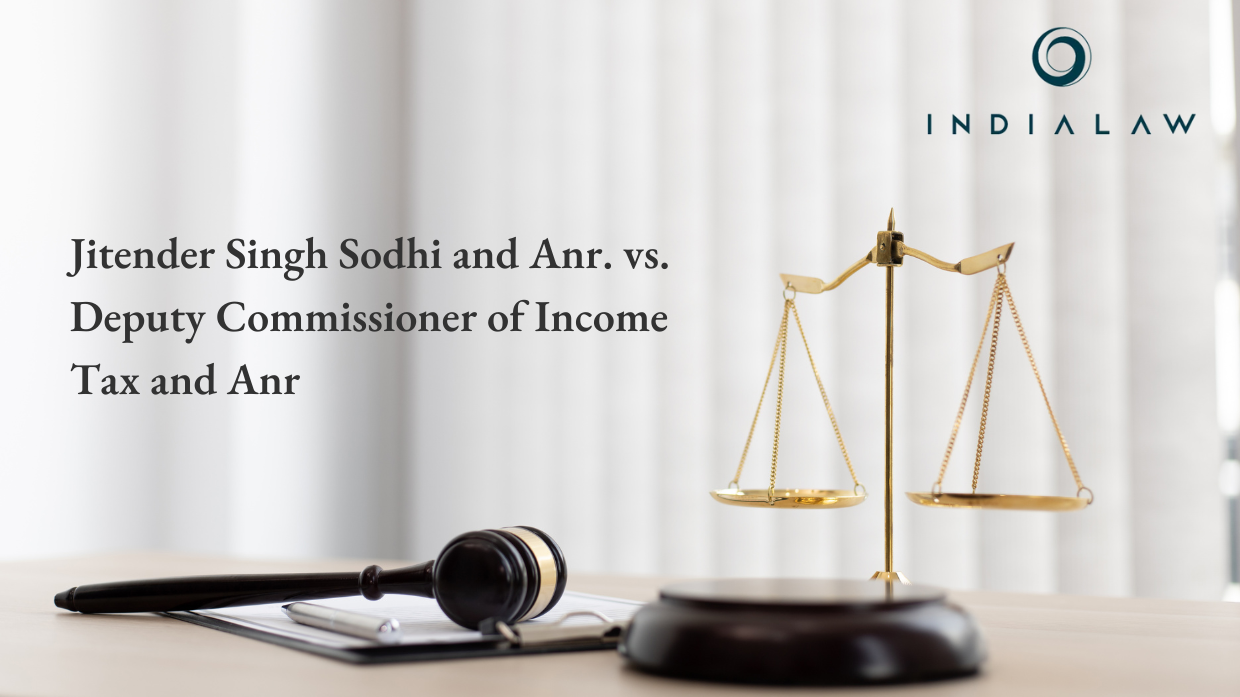Jitender Singh Sodhi and Anr. vs. Deputy Commissioner of Income Tax and Anr

INTRODUCTION
The Punjab & Haryana High Court Single Bench presided by Hon’ble Justice Mahabir Singh Sindhu, vide Judgment dated 13.05.2024 in Jitender Singh Sodhi and Anr. vs. Deputy Commissioner of Income Tax and Anr. held that when the proceedings under the Negotiable Instruments Act do not constitute debt, they cannot be stayed under Section 96 of the Insolvency and Bankruptcy Code.
BRIEF FACTS OF THE CASE
A Petition was filed under Section 482 of the Code of Criminal Procedure, 1973 (Cr.P.C.) seeking to quash the impugned order dated 21.08.2023, issued by the Judicial Magistrate First Class (JMFC), Chandigarh. The impugned order dismissed the Petitioner’s application for a stay of proceedings in a Complaint filed under Section 138 of the Negotiable Instruments Act, 1881 (NI Act). The Petitioner argued for a stay of proceedings based on the commencement of an interim moratorium under Section 96 of the Insolvency and Bankruptcy Code, 2016 (IBC).
The Respondents defended this Application by filing a written response. After hearing both sides and thoroughly examining the matter, the learned JMFC dismissed the Application for stay, leading to the present petition for quashing the impugned order.
Consequently, a petition was filed before the Hon’ble Punjab and Haryana High Court. The Hon’ble High Court clubbed 36 similar petitions and disposed of them vide order dated 13.05.2024.
CONTENTIONS OF THE PARTIES
The Petitioner argued that Section 96 of the Insolvency and Bankruptcy Code (IBC) imposes a complete and unequivocal bar on the continuation of proceedings before the Ld. JMFC under the Negotiable Instruments Act. Additionally, they contended that Section 14 of the IBC does not apply to personal guarantors, and the non-obstante clause in Section 238 of the IBC takes precedence over the provisions of the NI Act and accordingly prayed that the proceedings pending before the JMFC be stayed.
The Counsel for the Respondent, in opposition to the request, argued that according to the established law as elucidated by the Hon’ble Supreme Court in the case of Ajay Kumar Radheshyam Goenka Vs. Tourism Finance Corporation of India Ltd., proceedings under Section 138 of the Negotiable Instruments Act (NI Act) are distinct in nature. They emphasized that such proceedings are punitive rather than aimed at recovery, wherein individuals may face imprisonment and/or fines, unlike the provisions under the Insolvency and Bankruptcy Code (IBC). Hence, they asserted that the nature and scope of proceedings under both Acts are fundamentally different, and therefore, the impugned order does not warrant any intervention from this Court. Additionally, it was contended that the Petitioners, along with other co-accused, are currently undergoing prosecution for charges including cheating, forgery of records, and causing a financial loss amounting to Rs. 1301.67 crores to the Punjab National Bank.
DECISION OF THE COURT
The Hon’ble Court, while determining the case, has relied upon the ratio passed in the landmark judgment of Goenka’s case and P. Mohanraj’s case to establish its stance that during the subsistence of the interim-moratorium period as under Section 96 of the IBC, any impending legal action in respect of ‘any debt’ shall be deemed to have been stayed. It further observed that considering the legal position crystalized in various judgments passed by the Apex Court, Signatories/Directors cannot evade their penal liability under Section 138/141 of the Negotiable Instruments Act.
The court emphasized that proceedings under the Negotiable Instruments (NI) Act are not only considered to be related to debt, rather, they are punitive in nature and may result in imprisonment for a maximum period of two years or a fine up to twice the amount of the cheque, or both. As a result, they cannot be stayed under Section 96 of the IBC. This section of the IBC envisions an interim moratorium period where legal actions or proceedings related to debt are put on hold. The Hon’ble Court opined it is untenable to argue that the ongoing proceedings under the NI Act against both Petitioners, who serve as Managing Director/Director of the company, should be stayed, or that Section 96 of the Insolvency and Bankruptcy Code (IBC) should be seen as a hindrance to such action in any way.
Accordingly, the Petitions were dismissed.
By entering the email address you agree to our Privacy Policy.



